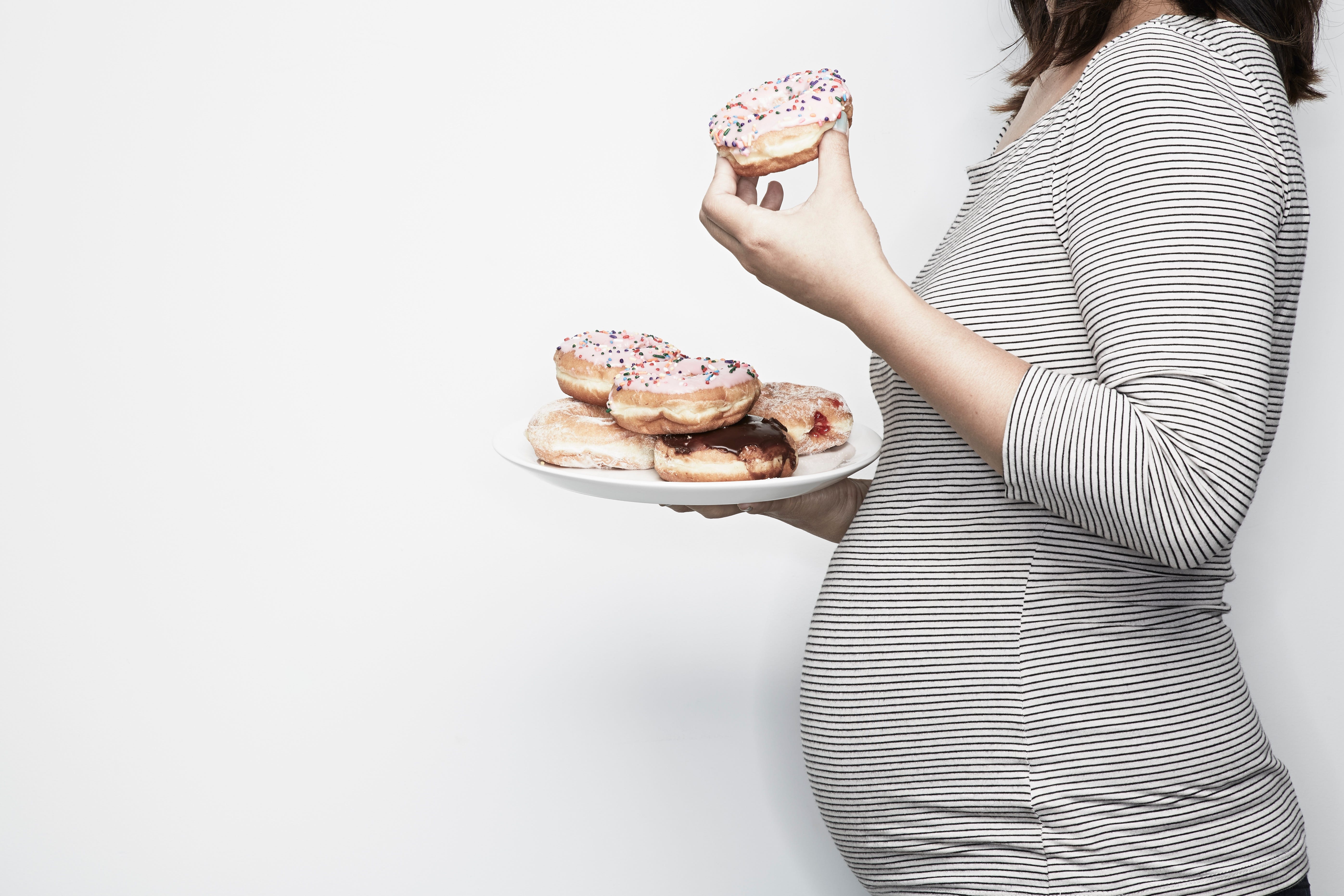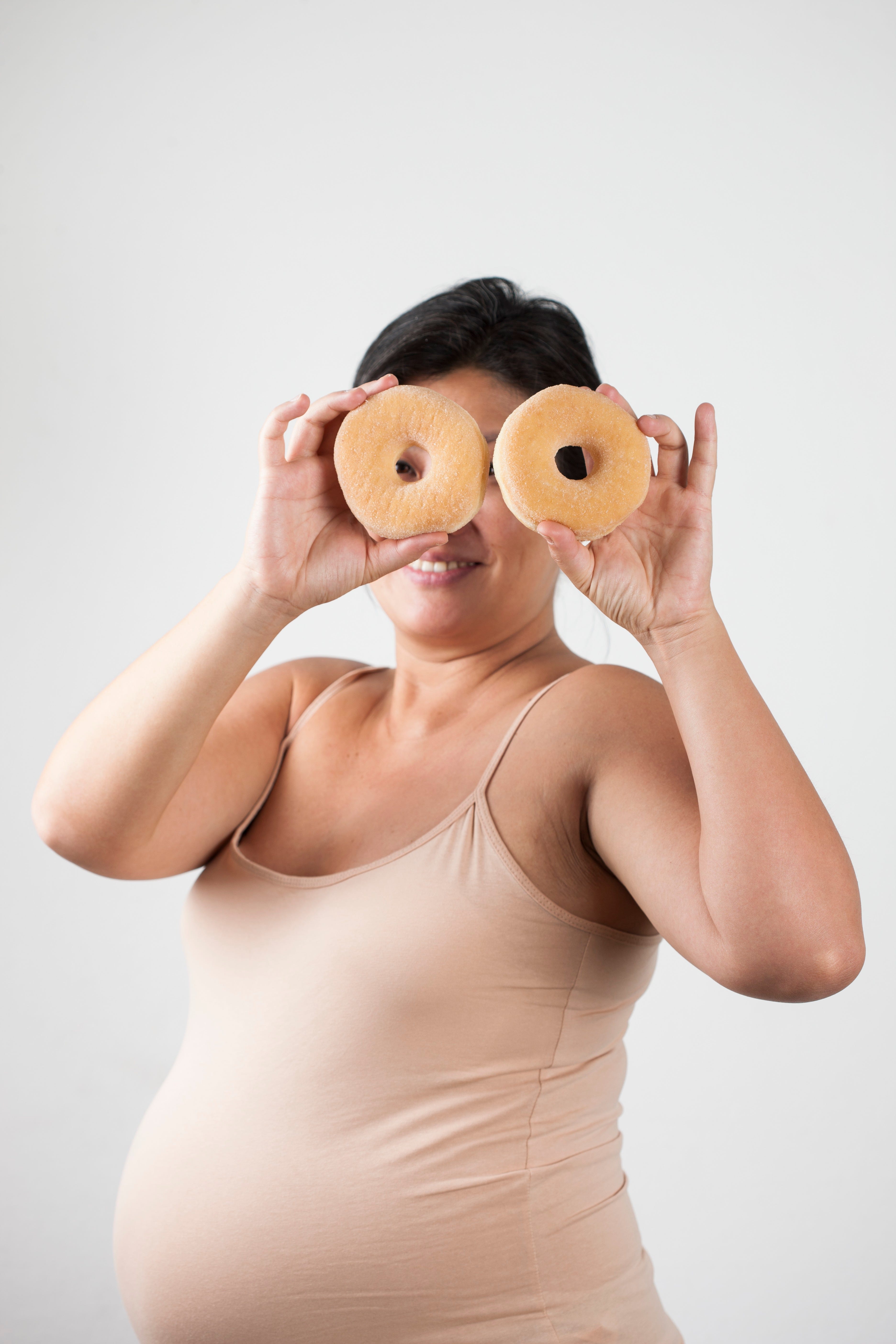
In large amounts, sugar isn't good for you -- and that may be especially true when you're pregnant.
What you eat during pregnancy fuels not only your body's arduous journey in growing a whole new human -- it can also set the stage for your child's health once they leave the womb. Too much sugar can affect a growing fetus and influence childbirth and beyond, especially if you're one of the many people diagnosed with gestational diabetes.
But before we get into the nitty-gritty of sugar, Dr. Gloria Bachmann, an OB-GYN and director of the Women's Health Institute at Rutgers University, says it's important to think about your general diet and overall health in pregnancy -- ideally before you're pregnant in the first place. Bachmann says that when you're contemplating pregnancy is the time to make sure you're eating the most nutritious diet you can, and that you're in the healthiest shape you can be in.
"There are so many various diets available," Bachmann says. "And I think the one that's most important is the one that's well balanced." Eating enough protein, fats and carbohydrates is important, but part of a well-rounded diet is limiting sugar intake.
So, what are the sugar rules in pregnancy? Read on for advice on how excessive sugar intake can affect your pregnancy and how to satisfy your sweet tooth while you're expecting.
Read more: Foods to avoid during pregnancy
How much sugar can I have?
Bachmann advises pregnant patients to keep their free sugar intake under 30 grams (a little over 7 teaspoons). Free sugar is added sugar, which includes the sweetness in fruit juices, desserts and other foods. Sugar that comes naturally in foods, including sugar in the cells of fruits and vegetables, doesn't count toward your intake because this type of sugar doesn't have a negative impact on health, according to the British Heart Foundation.
For scale, a packet of sugar you'd put in your coffee is typically 4 grams of free sugar. A pint of Ben & Jerry's "Cannoli" ice cream has 30 grams of sugar, or your total daily amount of free sugar. That's why it's especially important to make healthy swaps of your favorite foods -- say, a juicy orange for dessert instead of a cookie.
This is a general example of how much a person should eat in pregnancy, but your own limit may depend on other factors, including whether you've been diagnosed with gestational diabetes.
Read more: Why you feel bad after you eat sugar

What is gestational diabetes?
Gestational diabetes occurs in about 2 to 10% of pregnancies, and it's diagnosed only in people who are "gestating" (aka pregnant). It happens when your body can't make enough insulin during pregnancy, according to the Centers for Disease Control and Prevention. There usually aren't symptoms of gestational diabetes, and you'll need to be tested to see if you have it. It typically develops between the 24th and 28th weeks of pregnancy, Healthline reported.
Blood sugar levels usually return to normal after a person's baby is born, per the CDC, but about 50% of people who have gestational diabetes will go on to develop type 2 diabetes. Gestational diabetes also puts the pregnant person's child at increased risk of developing type 2 diabetes later in their own life and of being born early, which can lead to breathing difficulties according to the Mayo Clinic.
The high blood sugar levels that a pregnant person shares with the fetus can also cause the baby to get too big, Bachmann says, which can complicate pregnancy.
"The other problem with increased weight is that a vaginal birth may not be possible because the baby will be too big to get through the birth canal," Bachmann says, which will then make a C-section necessary.
Making sure you're healthy before getting pregnant can reduce your risk of gestational diabetes, as a lack of physical activity can increase your risk of developing it. People in larger bodies, people with Polycystic Ovary Syndrome, as well as Black, Hispanic, Native American and Asian American people are also at greater risk of gestational diabetes.
If you develop it, gestational diabetes can be managed by keeping your blood sugar levels low by following a low-sugar diet or meal plan prepared by your doctor or dietician. If eating healthy and staying active isn't enough, your doctor may prescribe insulin or other medication, per the CDC.
Can I have more sugar in the third trimester vs. the second, or vice versa?
Nope, Bachmann says -- you should monitor and limit your sugar intake throughout your pregnancy, no matter which of the three trimesters you're in.
Read more: Pregnancy timeline: What happens each month and trimester
What about fake sugar?
Bachmann says some artificial sweeteners are OK in moderation, including sucralose (Splenda) and aspartame. (People who have the hereditary disease phenylketonuria or PKU should avoid aspartame, because their bodies can't break down aspartame, according to Johns Hopkins Medicine.) However, people who're pregnant should avoid saccharin, Bachmann says, which can cross the placenta and stay in fetal tissue. Many different foods can contain saccharin, including diet sodas, chewing gum, canned fruit, baked goods, vitamins and more, according to the American Academy of Family Physicians.
Similar to sugar, the "moderation" element may be key in artificial sweeteners. While many health experts seem to agree that most sweeteners are fine for most people when consumed sparingly, one study links low-calorie sweeteners to childhood obesity. If you're trying to cut back on sugar and find yourself turning to artificial sweeteners, talk to your doctor about when to replace the real stuff with artificial or low-calorie sweeteners.
Just like you, every pregnancy is unique. And once you become pregnant, it's an unreasonable ask to expect change overnight. This may be complicated further if you experience nausea or vomiting as a symptom of pregnancy. In terms of diet when you're trying not to throw up, Bachmann says to work with yourself, but that it's important you continue to eat things that include protein, fiber, calcium, carbohydrates and other fuel your body needs.
"It's always easier said than done -- if you have really severe nausea and vomiting in pregnancy, you really have to modify and see what you can tolerate," Bachmann says. "Try to stick to as healthy a diet as possible."
The information contained in this article is for educational and informational purposes only and is not intended as health or medical advice. Always consult a physician or other qualified health provider regarding any questions you may have about a medical condition or health objectives.
"much" - Google News
November 21, 2021 at 09:00PM
https://ift.tt/3HEfO5z
Sugar cravings during pregnancy: How much sugar is too much? - CNET
"much" - Google News
https://ift.tt/37eLLij
Shoes Man Tutorial
Pos News Update
Meme Update
Korean Entertainment News
Japan News Update
Bagikan Berita Ini














0 Response to "Sugar cravings during pregnancy: How much sugar is too much? - CNET"
Post a Comment